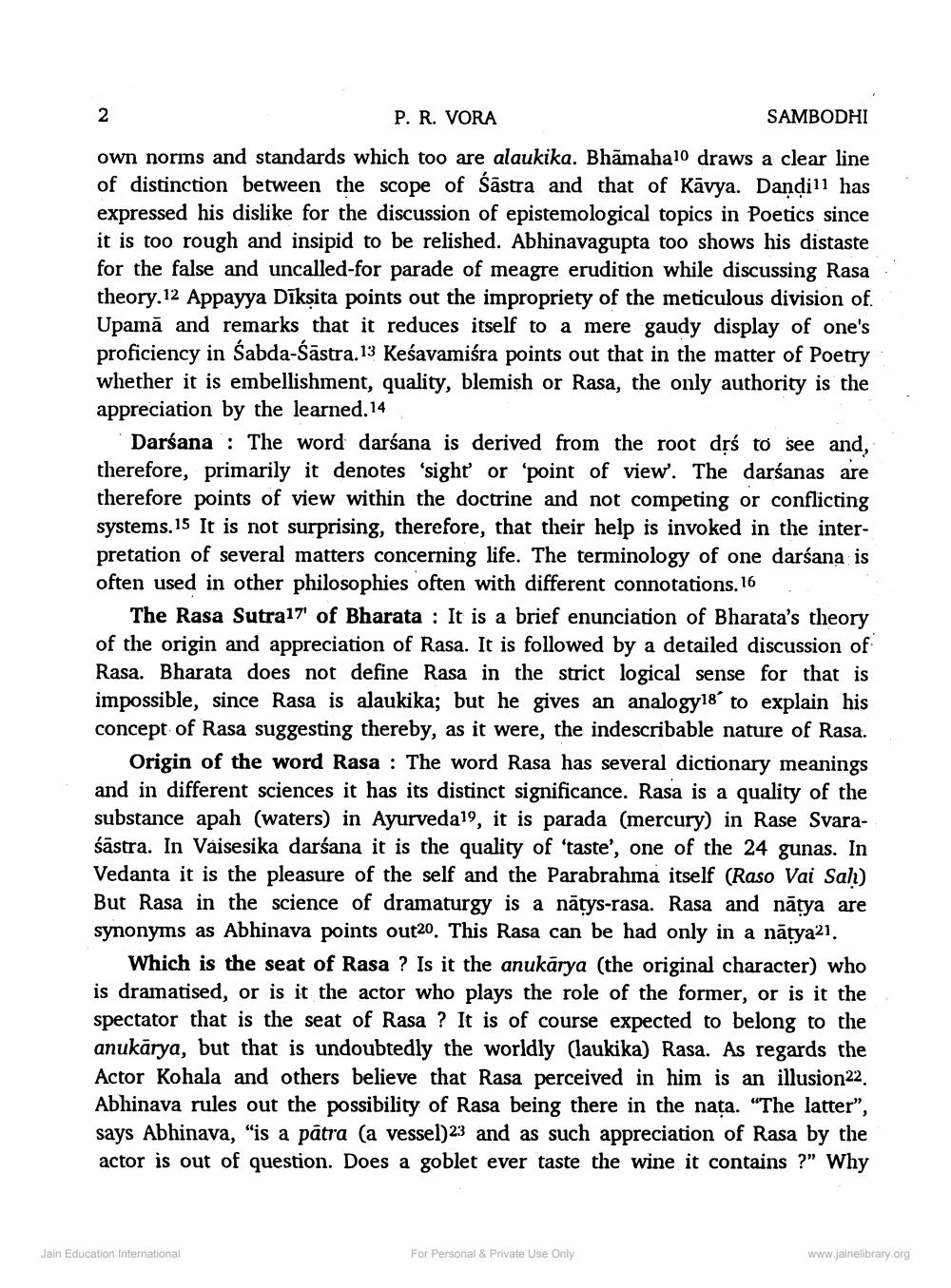Book Title: Sambodhi 2002 Vol 25 Author(s): Jitendra B Shah, N M Kansara Publisher: L D Indology Ahmedabad View full book textPage 7
________________ P. R. VORA SAMBODHI own norms and standards which too are alaukika. Bhāmahal0 draws a clear line of distinction between the scope of Sastra and that of Kavya. Dandill has expressed his dislike for the discussion of epistemological topics in Poetics since it is too rough and insipid to be relished. Abhinavagupta too shows his distaste for the false and uncalled for parade of meagre erudition while discussing Rasa theory. 12 Appayya Dīksita points out the impropriety of the meticulous division of Upamā and remarks that it reduces itself to a mere gaudy display of one's proficiency in Sabda-Šāstra. 13 Keśavamiśra points out that in the matter of Poetry whether it is embellishment, quality, blemish or Rasa, the only authority is the appreciation by the learned. 14 Darśana : The word darśana is derived from the root drś to see and, therefore, primarily it denotes 'sight or 'point of view. The darśanas are therefore points of view within the doctrine and not competing or conflicting systems. 15 It is not surprising, therefore, that their help is invoked in the interpretation of several matters concerning life. The terminology of one darśana is often used in other philosophies often with different connotations. 16 The Rasa Sutra17' of Bharata : It is a brief enunciation of Bharata's theory of the origin and appreciation of Rasa. It is followed by a detailed discussion of Rasa. Bharata does not define Rasa in the strict logical sense for that is impossible, since Rasa is alaukika; but he gives an analogy18ʻ to explain his concept of Rasa suggesting thereby, as it were, the indescribable nature of Rasa. Origin of the word Rasa : The word Rasa has several dictionary meanings and in different sciences it has its distinct significance. Rasa is a quality of the substance apah (waters) in Ayurveda19, it is parada (mercury) in Rase Svaraśāstra. In Vaisesika darśana it is the quality of 'taste', one of the 24 gunas. In Vedanta it is the pleasure of the self and the Parabrahma itself (Raso Vai Sah) But Rasa in the science of dramaturgy is a nātys-rasa. Rasa and nātya synonyms as Abhinava points out20. This Rasa can be had only in a nātya21. Which is the seat of Rasa ? Is it the anukārya (the original character) who is dramatised, or is it the actor who plays the role of the former, or is it the spectator that is the seat of Rasa ? It is of course expected to belong to the anukārya, but that is undoubtedly the worldly (laukika) Rasa. As regards the Actor Kohala and others believe that Rasa perceived in him is an illusion22. Abhinava rules out the possibility of Rasa being there in the nata. "The latter", says Abhinava, "is a patra (a vessel)23 and as such appreciation of Rasa by the actor is out of question. Does a goblet ever taste the wine it contains ?" Why Jain Education International For Personal & Private Use Only www.jainelibrary.orgPage Navigation
1 ... 5 6 7 8 9 10 11 12 13 14 15 16 17 18 19 20 21 22 23 24 25 26 27 28 29 30 31 32 33 34 35 36 37 38 39 40 41 42 43 44 45 46 47 48 49 50 51 52 53 54 55 56 57 58 59 60 61 62 63 64 65 66 67 68 69 70 71 72 ... 234
